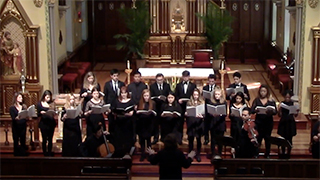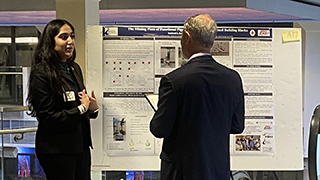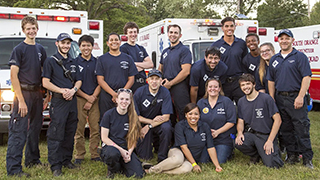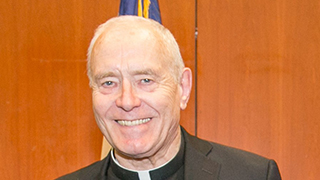Seton Hall and A.J. O’Connor Associates Advance Executive Coaching Education Through RESERO Program
Wednesday, October 15, 2025
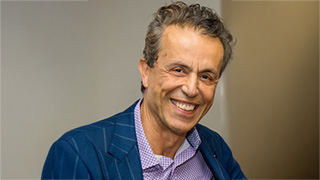
Kaveh Naficy, Lead Facilitator
Seton Hall University’s Division of Continuing Education and Professional Studies (CEPS), in collaboration with A.J. O’Connor Associates, recently hosted a session highlighting the RESERO Coach Certification Program, designed for professional coaches, Human Resources representatives, and organizational leaders. The program emphasizes experiential learning, presence, powerful questioning and reflective practice to elevate coaching skills and leadership capacity.
The session featured alumni and facilitators reflecting on their experiences in the program and its impact on professional and personal development.
Presence and Experiential Learning
Mary Lou Panzano, founder of Help People Prosper, discussed how the program transformed her approach to coaching. She explained that her coaching experience has become “exponentially different” since participating in RESERO, as she is now “so much more present, so much more in the moment.” She highlighted the value of peer coaching within the program, which allows participants to experience both giving and receiving coaching, providing insights into effective techniques and reflective practices.
Sandy Parkes, an HR professional with over 20 years of experience, emphasized the significance of being fully present. She described presence as “putting all that chatter behind you and truly engaging with the person in front of you” and noted that this approach generates tangible change for both the coach and the client.
One of the webinar’s key messages was the need for coaches to shift from a fixed mindset to a growth mindset. It also explored the practical application of the different levels of listening. Active listening was highlighted as a fundamental skill that every aspiring and existing coach must master. In effective coaching, the coach is encouraged to minimize their own presence in order to fully understand and absorb the perspective of the counterpart.
Thus, a coach must appreciate the four levels of listening: from focus on self to
factual listening, to listening for emotions, and finally, listening for context.
In addition, a coach should skillfully employ powerful questions, recognizing the
difference between closed and open-ended.
As Coach Kaveh Naficy noted, “It is one thing for the person being coached to agree with the coach during a session, and another for that agreement to be sustained and carried out beyond the session…(in the first scenario) the coach disappears, and the person being coached goes right back to what they are used to doing.” Too often, coaching falls short, not from lack of intention, but from missing two essentials: active listening and the ability to ask powerful questions.
Integrating Communication and Coaching
Linda Green, a Seton Hall graduate with a Master’s degree in Communication, discussed how RESERO allowed her to integrate her academic background with practical coaching. She shared that the program corrected her initial misconceptions about coaching and provided hands-on, experiential learning in a supportive cohort. Linda now works as a communication and career coach, emphasizing powerful questioning to help clients develop their own solutions. She explained that if the solution comes from the individual rather than the coach, it is more sustainable and meaningful.
Advanced Coaching Development
For experienced coaches, RESERO provides an opportunity to advance beyond basic tools and frameworks. Denise Yosafat, a PCC-certified coach, explained that even with prior certification, the program offered new perspectives on thinking differently as a coach. She highlighted that the program focuses less on pre-defined questions and more on being present and reflective in each coaching interaction.
Program Leadership and Facilitation
Jill Kennedy, of A.J. O’Connor Associates, described the broader mission of RESERO as fostering participants’ personal and professional wholeness. She emphasized that developing presence and observational skills are essential for effective coaching, helping participants move beyond performative behaviors to fully engage with others.
Lead facilitator, Kaveh Naficy, concluded the session by reinforcing the program’s goal of helping participants become “whole individuals” who can integrate personal and professional growth. He compared the program’s holistic approach to a personal growth journey, emphasizing the importance of presence and reflective practice.
Community and Collaborative Learning
Alumni discussed how the program enhanced their listening skills, strengthened their questioning techniques, and helped them facilitate meaningful growth in others. Participants engaged in exercises and peer coaching scenarios that encouraged them to identify root causes of challenges, rather than focusing on surface-level issues.
Future Opportunities
The RESERO Coach Certification Program distinguishes itself as a highly personalized alternative to mass-produced coaching training. Its emphasis on presence, reflection, and experiential learning continues to attract professionals seeking to enhance their coaching and leadership capabilities.
The next Coaching Presence Webinar on Giving and Receiving Feedback is scheduled for November 21, 2025. Valued at $75, it is being offered free of charge to all interested participants. If you are eager to enhance your coaching skills, click here to register for the upcoming session on November 21, 2025.
For further information about coaching education and other related matters, you can reach out to [email protected].
Categories: Education


